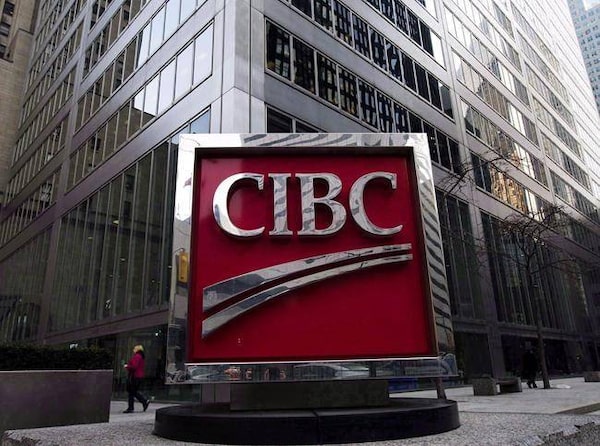
A CIBC sign is shown in Toronto's financial district on February 26, 2009. THE CANADIAN PRESS/Nathan DenetteThe Globe and Mail
From the moment he took over as chief executive officer, Victor Dodig confronted a nagging problem: What to do with FirstCaribbean, CIBC's troubled unit based in Barbados?
The division had been a slow-burning fire inside the bank for several years. That fire became a blaze right before he was named CEO in September, 2014.
In May of that year, CIBC took a $420-million writedown on the division, and by the end of that fiscal year, more than half of CIBC's total gross impaired loans – that is, loans the bank believed would likely not be repaid – were housed in a tiny cluster of sun-drenched islands. Meanwhile, the division contributed only 4 per cent profit of the bank's total revenue.
This week, investors finally got some insight into what Mr. Dodig might do, with CIBC confirming it is weighing whether to spin off FirstCaribbean and list it on a U.S. stock exchange, which would allow it to reduce its nearly 92-per-cent stake.
The crucial question is whether investors will show any love. The odds seem long: A U.S. listing could be a hard sell. Jamaica's National Commercial Bank tried something similar, but ultimately pulled the offering in 2016.
CIBC has tried an outright sale of FirstCaribbean but got nowhere. Talks with Trinidad-based Republic Bank resulted in nothing but lowball offers, according to people familiar with the negotiations. The U.S. spinoff seems like a last-ditch effort.
FirstCaribbean is certainly in much better shape than it was. The bank started slashing costs a few years back by consolidating back offices and shedding close to 15 per cent of its work force. Once Mr. Dodig took over the parent bank, he sent Gary Brown down to Barbados to do even more heavy lifting – the assumption being that Mr. Brown would polish FirstCarribean for a sale after his success unloading some U.S. capital markets businesses to Oppenheimer in 2007. He also helped clean up CIBC's structured credit portfolio during the financial crisis.
Last year FirstCaribbean posted a $142-million (U.S.) profit, and gross impaired loans have fallen to one-third of CIBC's total. Its thinly-traded shares are up almost 40 per cent since the start of 2016 on the Barbados Stock Exchange.
But how much better can things get? New investors are going to want to see some upside, and growth prospects aren't encouraging.
Revenue growth at FirstCaribbean has been effectively nil for five years, and Canadian competitors Royal Bank of Canada and Bank of Nova Scotia, who also operate in the region, have admitted it's tough going down there. Scotiabank has quietly been getting rid of troubled loans, and some are rumoured to be going for 10 to 20 cents on the dollar, according to a person familiar with the sales.
The roots of these troubles spread wide. To name a few: Trinidad, a big economic hub, has major exposure to plummeting gas prices because of its offshore production; hurricanes have ravaged a number of countries; and sweeping cost cuts are hard to enact because bank operations are spread out across multiple countries, each with its own government, and the workforce is largely unionized.
FirstCaribbean is particularly challenged by its home base of Barbados. The country's tourist dollars have returned somewhat from their post-financial crisis lows, but the local economy is still in rough shape. In September, Standard & Poor's downgraded the country's debt rating to CCC, deep in junk territory.
Because the debt rating is so weak and foreign investors have shied away, the government is having trouble funding itself. Its answer has been to put more pressure on local banks, and come January, they will be required to hold 20 per cent of their domestic deposits in government securities.
That's especially troubling because the risk of a debt restructuring in Barbados is quite high. Should it happen, a best-case scenario might involve extending the debt terms by a few years, meaning the banks wouldn't get their money back for a longer period. But there's a chance there will be a significant haircut on the value of these government securities, which would wipe out some of the banks' deposit base.
Regulatory risks loom, too. In 2015 allegations emerged that FirstCaribbean may have been used to help facilitate an illegal payment to an executive at FIFA, soccer's governing body, and earlier this month Barbados was added to European Union's list of tax havens, a collection of countries that the EU argues does not do enough to stop tax avoidance programs.
Despite all that, CIBC should be relieved that FirstCaribbean currently turns a solid profit: $142-million in net income is not something to shrug at, considering that Chicago-based PrivateBancorp, which it bought for $5-billion, posted a $208-million profit in 2016. But the Caribbean is a market with much lower potential than the U.S. Midwest.
It could be that CIBC gets a deal done by trying to spin off the asset for cheap. It just depends how badly Mr. Dodig and the board want this problem solved.
 Tim Kiladze
Tim Kiladze